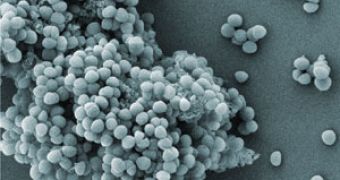American researchers have developed antibodies against a MRSA protein, which interfere with the growth of the bacteria, and are very “attractive candidates” for the first vaccine against Methicillin-resistant Staphylococcus aureus.
Edward Schwarz from the University of Rochester Medical Center in New York, believes that the studies conducted along with his colleagues, bring them closer to a MRSA vaccine than ever, because they have used mouse antibodies of one specific type - monoclonal antibodies or mAbs.
“Others have evaluated experimental passive immunization with rabbit polyclonal antibodies, which cannot be used in humans,” he explains.
The researchers developed antibodies against glucosaminidase, a subunit of the bacterial protein autolysin, which is crucial to MRSA's reproduction process.
The antibodies were developed from immune cells isolated in mice injected with glucosaminidase; some of these cells were selected to make “hybridoma” cells, able to produce antibodies against the protein.
The scientists eventually narrowed down the candidates to just four antibodies, and managed to slow down the growth of MRSA in a test tube.
After electron microscope analysis, they confirmed that bacteria cultured with one of these antibodies were unable to divide.
Even though this is a huge step towards developing a vaccine against MRSA, Jodi Lindsay, an MRSA expert at the St George's University of London Center for Infection in the UK is rather skeptical.
She says it's too early to be able to tell whether the antibodies hold potential for a vaccine.
“The study shows that the monoclonal antibody can partly inhibit the growth of MRSA in a test tube.
“This is not the same as killing MRSA.
“Many safe compounds can inhibit the growth of MRSA in a test tube, and many can kill as well.”
Lindsay adds that people who have been infected with MRSA already have natural antibodies, but this does not protect them from a reinfection.
The researchers are working on this by analyzing the levels of natural antibodies to the protein, in a small group of patients with S. aureus bone infections.
Schwarz believes those without natural antibodies could be candidates for a vaccine, RSC reports.
The researchers will announce early results from a trial in mice, which show that “passive immunization is protective.”
Phase I human trials should follow, next year.
The findings were announced at a meeting of the Orthopaedic Research Society in Long Beach, California, US.

 14 DAY TRIAL //
14 DAY TRIAL //